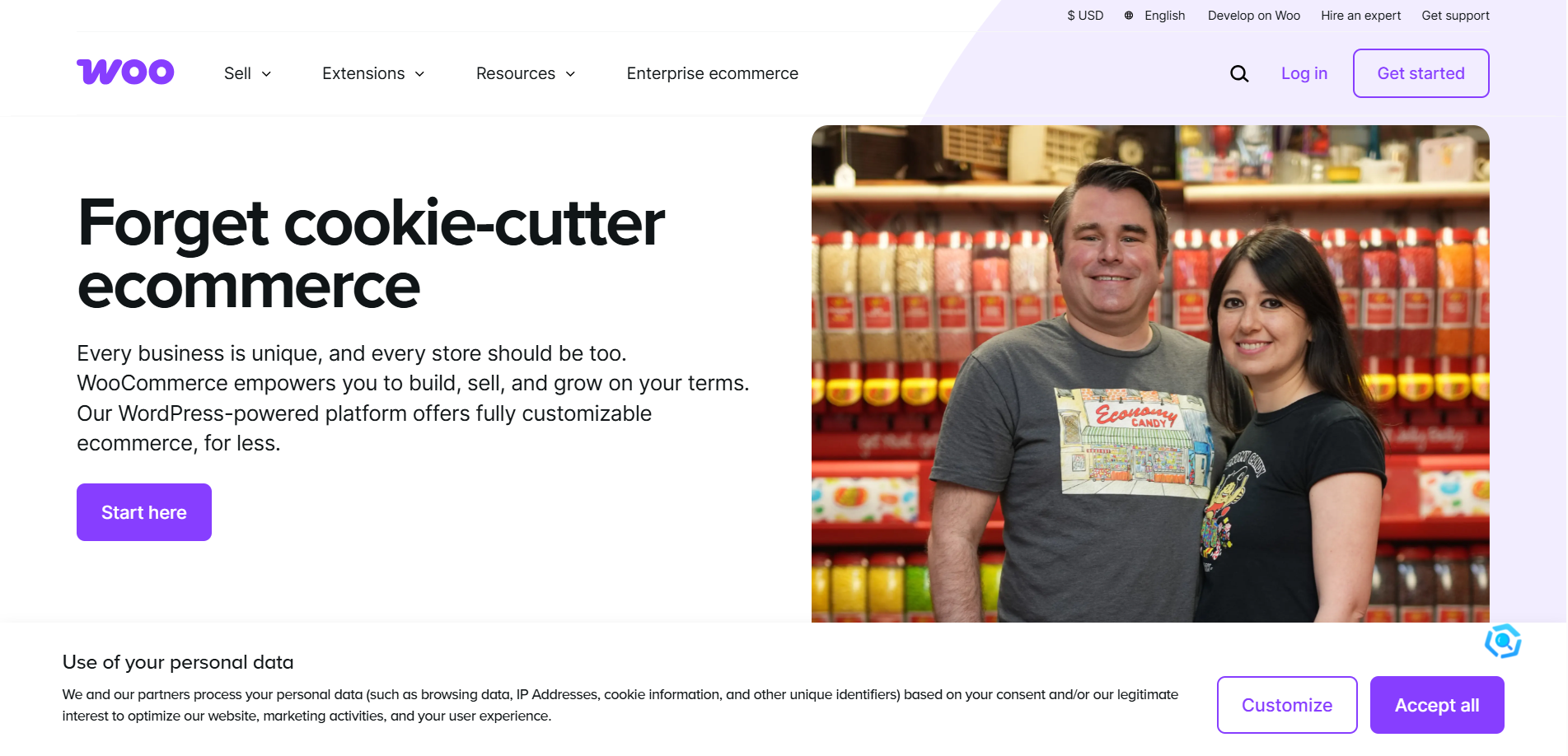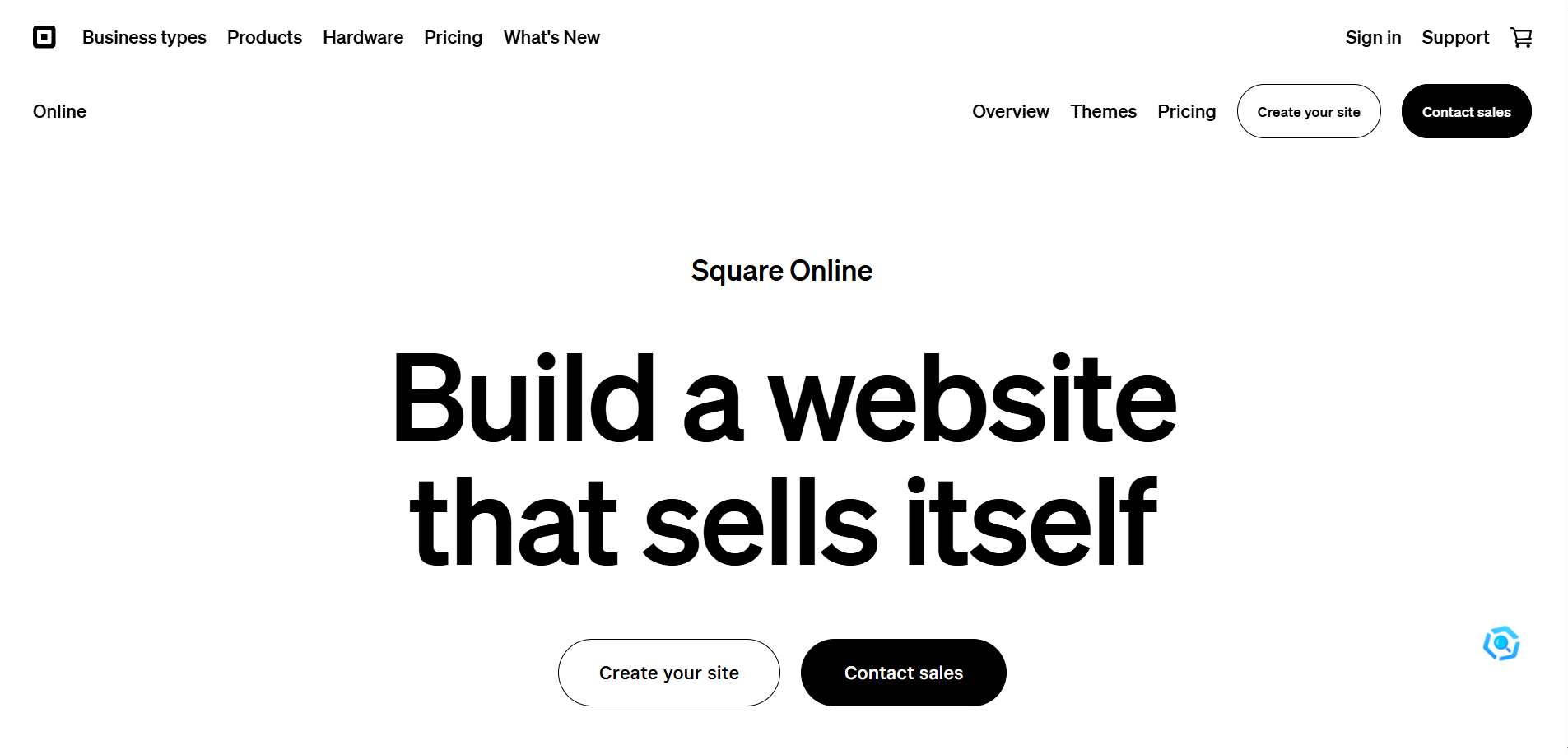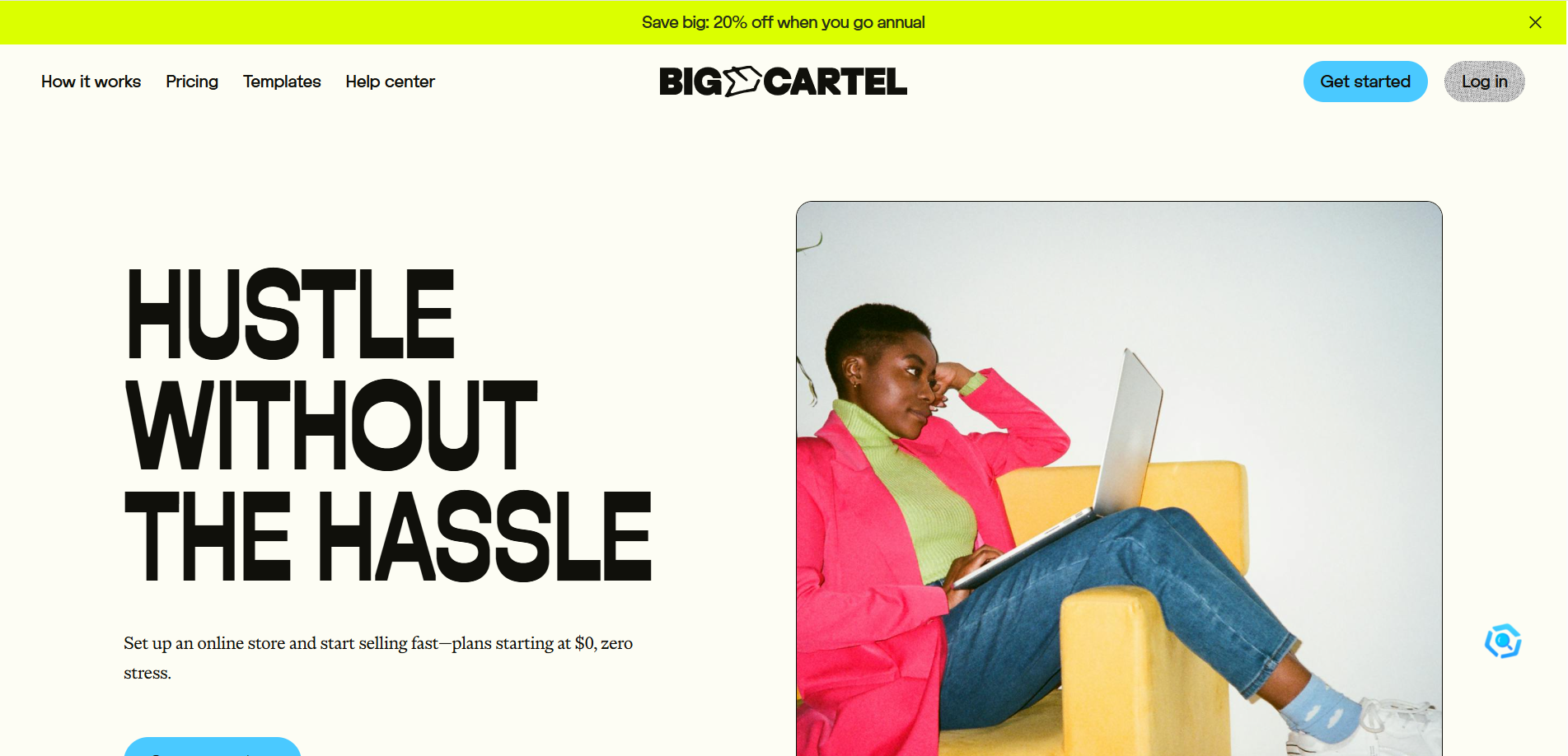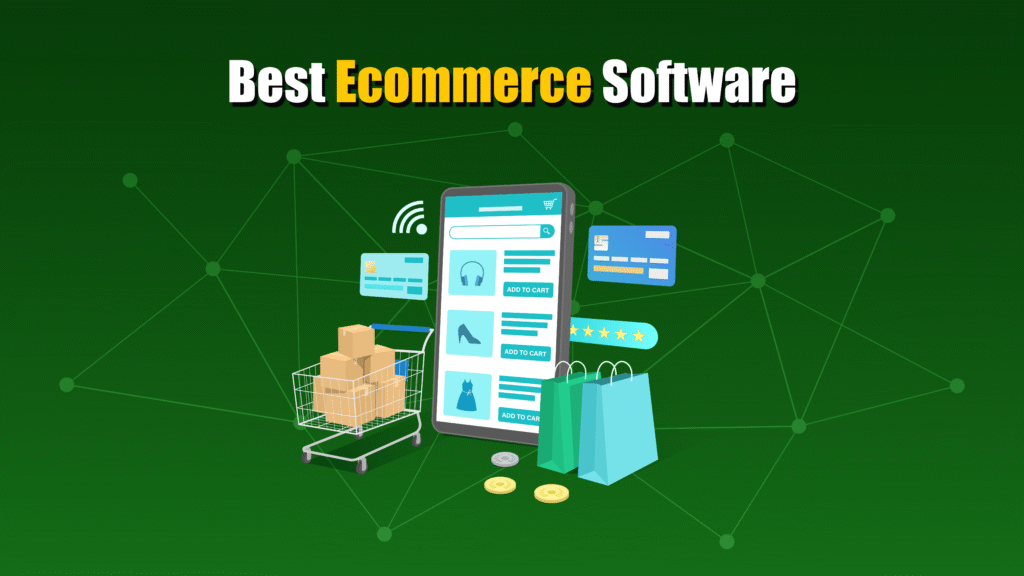Selecting the right ecommerce software is critical for launching, managing, and scaling a successful online store in today’s competitive digital marketplace. In 2026, ecommerce platforms have evolved far beyond simple product listings and payment processing. They now offer comprehensive solutions that integrate inventory management, marketing automation, multi-channel sales, AI-driven personalization, and seamless customer experiences.
The best ecommerce software solutions are designed to meet the diverse needs of businesses — from solo entrepreneurs and startups to growing SMEs and large enterprises. Choosing the right platform ensures operational efficiency, scalability, and the ability to adapt to changing market trends.
Top 15 Ecommerce Software in 2026
The ecommerce landscape is constantly changing with innovations in cloud computing, AI, mobile commerce, and omnichannel selling. Modern ecommerce platforms are packed with features to streamline everything from product management and order fulfillment to marketing analytics and customer engagement.
Below is a quick summary of the Top 15 Ecommerce Software solutions dominating the USA market in 2026, each excelling in different areas:
- Shopify – Best All-in-One Hosted Ecommerce Platform
- Amazon Seller Central – Best Marketplace for Maximum Reach
- Wix eCommerce – Best for Design-Focused Small Businesses
- BigCommerce – Best for Scalable and Feature-Rich Stores
- Adobe Commerce (Magento) – Best for Fully Customizable Enterprise Stores
- WooCommerce – Best for WordPress-Based Content-Driven Stores
- Square Online – Best for Unified POS and Online Sales
- Ecwid – Best for Adding Ecommerce to Existing Sites
- OpenCart – Best Free Open-Source Platform for Developers
- Sellfy – Best for Digital Product Creators
- Shift4Shop – Best with Built-in Payment Processing
- GoDaddy Online Store – Best for Quick and Easy Setup
- PrestaShop – Best Open-Source with Strong Community Support
- Big Cartel – Best for Artists and Small Catalogs
- Squarespace Commerce – Best for Visually Stunning Creative Stores
How This Top 15 List Was Created
Our evaluation team analyzed these ecommerce platforms based on the following key criteria to provide a balanced and insightful ranking:
-
Pricing Models: We assessed subscription tiers, transaction fees, and total cost of ownership to suit different business budgets and scales.
-
Features and Functionality: We examined critical ecommerce capabilities like product and inventory management, payment gateways, multi-channel selling, SEO, marketing tools, and analytics.
-
Scalability: We prioritized platforms that grow smoothly with businesses — from startups to enterprises with high sales volumes.
-
Ease of Use: We evaluated user interfaces and setup complexity, considering the needs of both non-technical users and developers.
-
Integration: We checked the ability to integrate with third-party tools like payment processors, shipping carriers, ERP, and marketing software.
-
Support and Community: Availability of customer support and an active developer or user community were key considerations.
Pricing Comparison for Small Businesses and Startups
For small businesses and startups, affordability and ease of use are crucial. Platforms like Shopify Basic, Wix eCommerce, Square Online, and Sellfy offer cost-effective entry points with essential ecommerce features for stores with limited products and sales volume.
Example Pricing:
-
Shopify Basic: $39/month
-
Wix Business Basic: $27/month
-
Square Online: Free plan available; paid from $12/month
-
Sellfy Starter: $29/month
Pricing for Growing SMEs and Medium Businesses
Growing businesses often require scalable platforms with richer features and multi-channel capabilities. BigCommerce, WooCommerce (with hosting), and Shift4Shop provide scalable plans that support increasing inventory, orders, and marketing automation.
Example Pricing:
-
BigCommerce Standard: $39/month
-
WooCommerce (hosting + plugins): Approx. $25–$100/month
-
Shift4Shop Basic: $29/month
-
Shopify Standard: $105/month
Pricing for Enterprise-Level Ecommerce
Large enterprises with complex ecommerce requirements often opt for Adobe Commerce (Magento), Shopify Plus, or customized WooCommerce and PrestaShop solutions. These platforms offer full customization, high security, and robust multi-store management but require higher investment.
Example Pricing:
-
Adobe Commerce Cloud: Custom, often starting in tens of thousands/year
-
Shopify Plus: Starts at $2000+/month
-
Custom WooCommerce/PrestaShop Enterprise Hosting: Variable
The ecommerce landscape is evolving quickly with advancements in cloud technology, AI-driven personalization, and automation. Modern ecommerce platforms extend beyond simple online storefronts to offer integrated solutions covering inventory management, multi-channel sales, marketing automation, customer analytics, and secure payment processing. Below, we list the top 15 ecommerce software solutions leading the market in 2025, each excelling in different areas to meet diverse business needs:
#1. Shopify

Shopify is a comprehensive, hosted ecommerce solution trusted by businesses of all sizes in the USA. It offers an intuitive website builder, extensive app marketplace, and powerful sales tools that enable merchants to quickly set up and scale their online stores across multiple channels.
Features
-
User-friendly drag-and-drop store builder.
-
Over 70 professional themes.
-
Multi-channel selling (Facebook, Instagram, Amazon).
-
Secure payment gateway (Shopify Payments + 100+ others).
-
App marketplace with 6,000+ apps.
-
Inventory and order management.
-
Built-in SEO and marketing tools.
-
24/7 customer support.
Review
Shopify leads the ecommerce market with its intuitive interface and powerful features. It enables businesses from startups to enterprises to create professional online stores quickly. The extensive app ecosystem allows customization without coding. Users appreciate Shopify’s reliability, scalability, and excellent customer support.
Pros
-
Extremely easy for beginners.
-
Large app marketplace for customization.
-
Robust multi-channel selling options.
-
Secure and reliable hosting.
-
Scalable to enterprise level.
Cons
-
Transaction fees if not using Shopify Payments.
-
Monthly cost can increase with app add-ons.
-
Customizations sometimes require developer skills.
Pricing
-
Basic Shopify: $39/month
-
Shopify: $105/month
-
Advanced Shopify: $399/month
-
Shopify Plus (enterprise): Custom pricing
Final Verdict
Shopify is the top choice for most US ecommerce businesses due to its balance of usability, scalability, and features. It’s ideal for all business sizes wanting a hosted, reliable ecommerce platform.
#2. Amazon Seller Central

Amazon Seller Central provides sellers access to the massive Amazon marketplace, allowing businesses to leverage Amazon’s trusted brand and logistics infrastructure. Sellers can quickly reach millions of customers, with options like Fulfillment by Amazon (FBA) simplifying storage, shipping, and customer service.
Features
-
Access to Amazon’s huge marketplace.
-
Fulfillment by Amazon (FBA) for warehousing, shipping.
-
Customer service and returns handled by Amazon.
-
Sponsored product ads and promotions.
-
Multi-channel fulfillment for other sales channels.
-
Sales analytics and reporting.
Review
Amazon offers unparalleled market access, letting sellers reach millions instantly. FBA simplifies logistics and customer service. However, Amazon limits branding control and sellers face high fees and competition. It’s best for businesses wanting fast market entry.
Pros
-
Massive customer base.
-
Trusted brand and Prime shipping.
-
Hands-off fulfillment and support.
-
Powerful advertising options.
Cons
-
High referral and fulfillment fees.
-
Limited branding/customization.
-
Account suspension risks.
-
Competitive marketplace pressures.
Pricing
-
Individual plan: No monthly fee, $0.99 per sale
-
Professional plan: $39.99/month + selling fees
Final Verdict
Amazon is essential for sellers seeking rapid access to a large audience but is less suited for those wanting full brand control or a standalone store.
#3. Wix eCommerce

Wix eCommerce blends Wix’s flexible website building platform with ecommerce functionality, providing small businesses and creatives an easy way to build visually stunning stores without coding. It’s great for stores with simpler inventory and sales needs.
Features
-
Drag-and-drop website builder with ecommerce capabilities.
-
Hundreds of customizable templates.
-
Supports multiple payment options (credit cards, PayPal).
-
Inventory and order management.
-
Marketing tools including email campaigns and SEO.
-
App market for extended functionality.
-
Mobile optimized design.
Review
Wix combines an easy website builder with basic ecommerce tools, great for small stores or creative entrepreneurs wanting design freedom. It lacks some advanced ecommerce features found in dedicated platforms but is perfect for beginners and small sellers.
Pros
-
Highly customizable website designs.
-
Intuitive drag-and-drop interface.
-
Affordable plans with ecommerce features.
-
Good for small to medium stores.
Cons
-
Limited advanced ecommerce features.
-
Not ideal for large stores or complex inventory.
-
Can get expensive when adding apps.
Pricing
-
Business Basic: $27/month
-
Business Unlimited: $32/month
-
Business VIP: $59/month
Final Verdict
Wix eCommerce is a great option for small businesses or individuals who want an attractive website with integrated selling, but it may fall short for high-volume or complex ecommerce needs.
#4. BigCommerce

BigCommerce is a powerful, scalable ecommerce platform designed for growing businesses and enterprises. It offers a broad set of built-in features that minimize the need for third-party apps, and it supports selling across multiple channels without charging transaction fees.
Features
-
No transaction fees.
-
Advanced SEO tools.
-
Multi-channel selling (Amazon, eBay, Facebook, Instagram).
-
Unlimited products, storage, and bandwidth.
-
Responsive themes.
-
Built-in marketing and analytics tools.
-
Multiple payment gateway support.
Review
BigCommerce is favored by businesses that want to scale without worrying about transaction fees and prefer extensive native features. Its SEO capabilities and multi-channel integration are top-notch, although it requires more technical understanding compared to Shopify.
Pros
-
No transaction fees.
-
Strong SEO and marketing tools.
-
Scalable and robust.
-
Extensive multi-channel support.
Cons
-
Learning curve can be steep.
-
Annual sales limits on plans can force upgrades.
-
Somewhat limited design customization without coding.
Pricing
-
Standard: $39/month
-
Plus: $105/month
-
Pro: $399/month
-
Enterprise: Custom pricing
Final Verdict
BigCommerce is an excellent choice for mid-sized to large businesses seeking a feature-rich, scalable ecommerce platform with no transaction fees.
#5. Adobe Commerce (Magento)

Adobe Commerce, formerly Magento, is an open-source ecommerce platform renowned for its high flexibility and extensive customization capabilities. It is widely used by enterprises and tech-savvy merchants who require advanced features and full control over their ecommerce experience.
Features
-
Fully customizable open-source codebase.
-
Multi-store and multi-language support.
-
Advanced inventory and product management.
-
Extensive marketing, SEO, and analytics tools.
-
Large extensions marketplace.
-
Enterprise-grade security and scalability.
Review
Adobe Commerce offers unparalleled customization but requires developer resources and technical know-how. It is ideal for enterprises with complex needs, providing powerful features but at a higher cost and maintenance requirement.
Pros
-
Limitless customization.
-
Supports complex, large-scale ecommerce setups.
-
Large developer community and extensions.
-
Enterprise security and scalability.
Cons
-
Requires technical expertise.
-
High setup and maintenance costs.
-
Not beginner-friendly.
Pricing
-
Open Source: Free (excluding hosting and development costs).
-
Commerce Cloud: Custom enterprise pricing.
Final Verdict
Best for enterprises and developers seeking total flexibility and power, Adobe Commerce is not suited for small businesses without technical resources.
#6. WooCommerce

WooCommerce is a free, open-source WordPress plugin that enables businesses to turn their WordPress websites into fully functional online stores. It’s ideal for those who want to integrate ecommerce with content marketing.
Features
-
Fully integrates with WordPress.
-
Large library of themes and plugins.
-
Supports physical and digital products.
-
Multiple payment gateways.
-
Inventory and tax management.
-
Extensive customization through code and plugins.
Review
WooCommerce is popular among bloggers, small businesses, and developers comfortable with WordPress. It offers great flexibility but can require technical skills to set up and maintain, especially when scaling.
Pros
-
Free plugin with no monthly fees.
-
Strong WordPress ecosystem.
-
Highly customizable.
-
Great for content-driven stores.
Cons
-
Requires WordPress knowledge.
-
Costs can add up with premium plugins and hosting.
-
Maintenance responsibility lies with the store owner.
Pricing
-
Free plugin, but hosting starts around $5–$25/month.
-
Paid extensions and themes vary.
Final Verdict
WooCommerce is ideal for WordPress users wanting tight integration of content and ecommerce but needs technical know-how.
#7. Square Online

Square Online is an ecommerce solution built by Square that seamlessly integrates online sales with Square’s popular point-of-sale hardware. It’s great for small to medium retailers looking to unify in-store and online sales.
Features
-
Simple store builder.
-
Integrated with Square POS system.
-
Supports in-person and online payments.
-
Inventory syncing between channels.
-
Free plan available.
-
Marketing and SEO tools.
Review
Square Online is praised for ease of use and tight POS integration. It’s excellent for existing Square users but offers fewer advanced ecommerce features compared to other platforms.
Pros
-
Integrated with Square POS.
-
Easy to set up and manage.
-
Free plan available.
-
Good for omnichannel retail.
Cons
-
Limited customization.
-
Less suitable for large stores.
-
Transaction fees can be high.
Pricing
-
Free plan: 2.9% + $0.30 per transaction.
-
Paid plans start at $12/month with lower transaction fees.
Final Verdict
Perfect for small businesses using Square hardware wanting a simple online store integrated with in-person sales.
8. Ecwid

Ecwid is a lightweight ecommerce solution that lets users add online stores to any existing website or social media page. It’s highly flexible for businesses wanting to keep their current website but add ecommerce capabilities.
Features
-
Embed store into any site or social platform.
-
Mobile-friendly.
-
Multi-channel selling.
-
Supports multiple payment gateways.
-
Inventory and order management.
-
Free plan available.
Review
Ecwid is a great choice for businesses not wanting to build a new website but add online sales quickly. It’s less feature-rich than full ecommerce platforms but very convenient.
Pros
-
Easy to add ecommerce anywhere.
-
Free plan for small stores.
-
Supports multichannel selling.
-
User-friendly dashboard.
Cons
-
Limited features compared to full platforms.
-
Design customization is limited.
-
May not scale well for large stores.
Pricing
-
Free plan: Up to 10 products.
-
Venture: $15/month.
-
Business: $35/month.
-
Unlimited: $99/month.
Final Verdict
Ecwid suits businesses wanting to add ecommerce to existing sites with minimal hassle.
#9. OpenCart

OpenCart is a free, open-source ecommerce platform favored by tech-savvy users for its simplicity and extensibility. It’s suitable for businesses that want full control over their store and have developer resources.
Features
-
Open-source and customizable.
-
Multi-store and multi-language support.
-
Large extension marketplace.
-
Supports multiple payment gateways.
-
SEO-friendly URLs.
Review
OpenCart offers good flexibility at no licensing cost, but requires technical skills for setup and maintenance. It’s popular for custom ecommerce stores on a budget.
Pros
-
Free and open-source.
-
Large extension marketplace.
-
Multi-store support.
-
Good for developers.
Cons
-
Setup and maintenance can be complex.
-
Limited official support.
-
Basic default theme.
Pricing
-
Free software; costs for hosting, development, and extensions.
Final Verdict
OpenCart is ideal for businesses with technical resources looking for customizable ecommerce without licensing fees.
#10. Sellfy

Sellfy is an ecommerce platform specializing in digital products like ebooks, courses, and software. It focuses on simplicity and fast setup for creators selling digital goods.
Features
-
Easy digital product sales.
-
Supports subscriptions and physical products.
-
Built-in marketing tools.
-
Customizable store.
-
Integrated payment processing.
Review
Sellfy is favored by creators and entrepreneurs focused on digital products. It lacks advanced features for complex ecommerce but excels in simplicity.
Pros
-
Simple and fast to launch.
-
Great for digital product sellers.
-
Integrated marketing and analytics.
-
No transaction fees.
Cons
-
Limited customization.
-
Not suited for large physical stores.
-
Fewer integrations than major platforms.
Pricing
-
Starter: $29/month.
-
Business: $49/month.
-
Premium: $99/month.
Final Verdict
Sellfy is perfect for digital creators wanting an easy-to-use ecommerce platform without complexity.
#11. Shift4Shop

Shift4Shop (formerly 3dcart) is a full-featured ecommerce platform offering a comprehensive suite of tools including built-in payment processing. It supports merchants with a wide range of features and integrations.
Features
-
Built-in payment gateway (Shift4).
-
Unlimited products and bandwidth.
-
Multi-channel selling.
-
SEO and marketing tools.
-
Mobile responsive themes.
-
Abandoned cart recovery.
Review
Shift4Shop provides a robust feature set and good value, especially for users who want integrated payment processing. It has a steeper learning curve than some competitors.
Pros
-
Built-in payment processing.
-
Feature-rich out of the box.
-
No transaction fees.
-
Good for medium to large stores.
Cons
-
User interface can be complex.
-
Less popular, so smaller app ecosystem.
-
Support quality varies.
Pricing
-
Free (Shift4 payment gateway only).
-
Basic: $29/month.
-
Plus: $79/month.
-
Pro: $229/month.
Final Verdict
Good for merchants wanting an all-in-one platform with integrated payments and strong native features.
#12. GoDaddy Online Store

GoDaddy’s ecommerce offering is built on its website builder, making it easy for beginners to launch simple online stores. It’s suitable for very small businesses and solopreneurs.
Features
-
Easy drag-and-drop store builder.
-
Built-in marketing tools.
-
Supports multiple payment options.
-
Inventory and order management.
-
Mobile-friendly design.
Review
GoDaddy Online Store is very beginner-friendly but lacks advanced ecommerce features and customization. It’s good for quick, simple stores.
Pros
-
Simple setup.
-
Integrated marketing tools.
-
Affordable pricing.
-
Good customer support.
Cons
-
Limited customization.
-
Basic ecommerce features.
-
Not suited for large or complex stores.
Pricing
-
Basic: $29.99/month.
-
Standard: $39.99/month.
-
Premium: $49.99/month.
Final Verdict
Best for beginners who want a straightforward ecommerce presence without bells and whistles.
#13. PrestaShop

PrestaShop is an open-source ecommerce platform offering powerful features and a large community. It’s popular in Europe and gaining ground in the USA for businesses needing customization.
Features
-
Open-source and customizable.
-
Multilingual and multi-currency support.
-
Large module marketplace.
-
SEO tools.
-
Detailed product management.
Review
PrestaShop offers flexibility and control but requires technical knowledge. Its free core software is attractive but add-ons and hosting cost extra.
Pros
-
Open-source freedom.
-
Wide range of modules.
-
Good SEO capabilities.
-
Active community.
Cons
-
Requires technical skills.
-
Hosting and add-ons cost extra.
-
Support depends on community or paid plans.
Pricing
-
Free core software.
-
Hosting from $5/month upwards.
-
Modules and themes vary in price.
Final Verdict
Great for tech-savvy merchants wanting customization without licensing fees.
#14. Big Cartel

Big Cartel is a simple ecommerce platform tailored to artists and makers selling small numbers of products. It emphasizes ease of use and low cost for creatives.
Features
-
Simple store setup.
-
Limited product listings (up to 300).
-
Mobile responsive themes.
-
Discount codes and promo tools.
-
Supports physical and digital products.
Review
Big Cartel is perfect for artists and independent sellers with small catalogs. It’s easy to use but lacks advanced ecommerce features.
Pros
-
Very easy to use.
-
Affordable pricing.
-
Designed for creatives.
-
Good for small catalogs.
Cons
-
Limited product count.
-
Few ecommerce features.
-
Not for growing stores.
Pricing
-
Free plan: Up to 5 products.
-
Paid plans: $9.99 to $19.99/month.
Final Verdict
Ideal for artists and small creators who want a simple online store with minimal fuss.
#15. Squarespace Commerce

Squarespace Commerce integrates ecommerce into the popular Squarespace website builder, focusing on beautifully designed stores ideal for creatives and small businesses.
Features
-
Elegant, designer templates.
-
Built-in ecommerce features.
-
Supports subscriptions and digital products.
-
Payment processing via Stripe and PayPal.
-
Inventory and order management.
-
Marketing and SEO tools.
Review
Squarespace Commerce is great for businesses that want a strong visual brand presence with moderate ecommerce needs. It’s less robust for high-volume stores but excellent for creative entrepreneurs.
Pros
-
Stunning design templates.
-
Easy to use.
-
Built-in marketing tools.
-
Good for small to medium stores.
Cons
-
Limited advanced ecommerce features.
-
Transaction fees on lower plans.
-
Less flexibility than Shopify or BigCommerce.
Pricing
-
Basic Commerce: $27/month.
-
Advanced Commerce: $49/month.
Final Verdict
Squarespace Commerce suits creatives and small businesses prioritizing aesthetics with ecommerce functionality.
Conclusion
Choosing the right ecommerce software is a foundational decision that can significantly impact your online business’s success. In 2026, ecommerce platforms offer a wide range of powerful features, from seamless multi-channel selling and advanced marketing automation to AI-driven personalization and robust analytics. Whether you are a solo entrepreneur launching your first store, a growing SME scaling operations, or a large enterprise demanding full customization, there is an ecommerce platform tailored to your needs.
Platforms like Shopify and BigCommerce provide scalable, user-friendly solutions ideal for most businesses, while Adobe Commerce and WooCommerce offer unparalleled customization for those with technical expertise. Meanwhile, niche-focused platforms such as Sellfy and Big Cartel cater to digital creators and artists with simpler requirements.
By carefully evaluating factors such as pricing, features, scalability, ease of use, and support, you can select the ecommerce software that aligns best with your business goals. Leveraging the right platform will streamline operations, enhance customer experience, and drive growth in today’s competitive digital marketplace.
Frequently Asked Questions (FAQs)
Which ecommerce platform is best for beginners?
Shopify and Wix eCommerce are excellent choices for beginners due to their intuitive interfaces, easy setup, and extensive support resources.
Can I sell both physical and digital products on these platforms?
Yes, most ecommerce platforms like Shopify, WooCommerce, and Sellfy support both physical and digital products.
Do these ecommerce platforms support multi-channel selling?
Many platforms, including Shopify, BigCommerce, and Ecwid, allow you to sell on marketplaces like Amazon and eBay, and social channels like Facebook and Instagram.
How much does it cost to start an online store?
Costs vary by platform and plan, starting from free or around $10–$30/month for basic plans, plus transaction fees, hosting, and any premium apps or extensions.
What is the difference between hosted and open-source ecommerce platforms?
Hosted platforms (e.g., Shopify, BigCommerce) manage hosting, security, and updates for you, making them easier to use. Open-source platforms (e.g., WooCommerce, Magento) offer greater customization but require technical management.
Can I migrate my store from one platform to another?
Yes, most platforms support migration tools or services, but the process may require technical assistance depending on data complexity.
Are these platforms mobile-friendly?
Yes, all top ecommerce software solutions offer mobile-responsive themes and mobile apps to manage your store on the go.
How important is SEO for my online store?
SEO is critical for attracting organic traffic. Platforms like Shopify, BigCommerce, and WooCommerce offer built-in SEO tools to help optimize your store for search engines.
